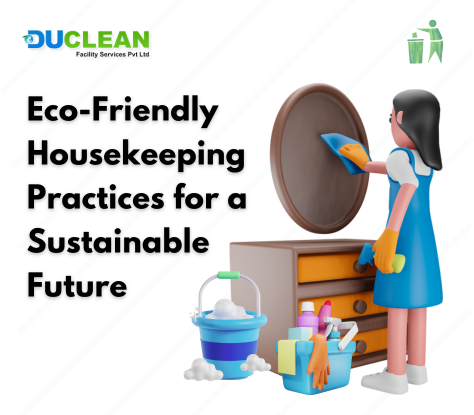In the era of diminishing natural resources, sustainability has become more crucial than ever. Adapting to eco-friendly housekeeping practices in hospitals, commercial spaces, hotels, and residential places significantly contributes to a greener planet. Incorporating sustainable methods into the cleaning routine will reduce the carbon footprint, promote healthier living conditions, and ultimately save money.
At Duclean, we uphold the importance of eco-friendly housekeeping practices for a better future. In this blog, we’ll share eight essential tips that every housekeeper needs to adapt for a sustainable future.
1. Choosing the Right Products
The first step towards sustainable living is to incorporate environmentally friendly cleaning products. The majority of cleaning agents contain harsh chemicals that can be harmful to the environment as well as to human beings. Switching to cleaning products that are biodegradable, non-toxic, and chemical-free will be the first step towards an eco-friendly life. When purchasing cleaning agents, whether for the housekeeping of hospitals, hotels, commercial spaces, or residential spaces, always avoid products that contain phosphates, chlorine, or any artificial fragrance agents.
2. Go Natural as Much as Possible
All-natural cleaning solutions can be a great alternative to cleaning chemicals. Basic kitchen ingredients like vinegar, baking soda, lemon juice, and essential oils are the best options for cleaning various surfaces in hospitals, hotels, and homes. For instance:
- For glass cleaning, use vinegar and water in an equal proportion.
- Baking soda can be the ultimate scrubber for cleaning sinks and bathrooms.
- The antibacterial properties of lemon juice make it the best natural disinfectant, and it adds a fresh scent of citrus to the surroundings.
- The antimicrobial properties of essential oils like tea tree, lavender, and eucalyptus work as the best odor removers.
3. Efficient Use of Water is Necessary
Water is the most precious natural resource, and water conservation is crucial for sustainable housekeeping. For efficient water usage, a housekeeper has to pay attention to the following:
- Ensuring no leakages from the plumbing fittings.
- Using a bucket of water for mopping instead of continuous running water.
- Installing water-efficient fixtures such as low-flow faucets, automatic taps, and flushes requires fewer water disposals.
- Water conservation fittings like rainwater harvesting are used to keep the groundwater level healthier, and water treatment plants are used to reuse the cleaned water.
- Efficient use of dishwashers and washing machines in hotels, hospitals, and homes will reduce water usage as much as possible.
4. No Single-Use Cleaning Tools
Using single-use cleaning tools is a major contributor to landfills. Instead, opt for reusable cleaning, like:
- Microfiber cloths for dusting and cleaning, which can be washed and reused multiple times.
- Reusable mops with cloth padding against disposable ones.
- Heavy-duty scrubs and brushes are for deep cleaning and can be reused again and again.
These tools not only reduce waste but also tend to be more effective and economical in the long run.
5. Proper Waste Management
Having effective waste management is significant for eco-friendly housekeeping, which includes:
- Segregation of waste at the source is necessary for proper waste management.
- Recycling paper, plastic, glass, and metal is the priority to reduce waste.
- Biodegradable waste like food scraps and organic waste needs to be treated to make compost that can be used in gardening and farming.
- Careful disposal of hazardous waste from hospitals to reduce the danger of contamination.
- Reducing the use of single-use plastic will reduce the daily generation of waste and landfills.
6. Use of Energy-Efficient Appliances
The housekeeping process is complex and lengthy and requires modern appliances to make it efficient. Electronic appliances like pressure washers, vacuum cleaners, floor moppers, washing machines, dryers, and dishwashers. Energy-efficient appliances may drastically lower the amount of energy used in your home.
- Make use of appliances with an Energy Star rating, since these are made to be more energy-efficient.
- Convert to LED light bulbs instead of incandescent ones. They last longer and use less energy.
- Unplug appliances to prevent invisible energy loss while not in use.
7. Adapt Eco-Friendly Habits
To improve overall sustainability implementing more green living activities in our daily lives can be an addition to a clean and sustainable future.
- Power saving is an essential habit for green living, use natural light as much as possible to reduce power consumption.
- Grow indoor plants to bring some natural elements and better air quality into your house.
- Promote fresh air circulation and ventilation by opening windows to lessen the demand for air conditioning.
8. Educate and Engage Your Family
Maintaining sustainability at hospitals, hotels, workplaces, and at home requires cooperation. Involve family and roommates, employees, patients, visitors, and tourists in the process of teaching them the value of eco-friendly behaviors. This is a significant method to make sure that everyone is committed to maintaining a sustainable environment and taking responsibility.
Conclusion
Incorporating eco-friendly housekeeping practices is a meaningful way to contribute to a sustainable future. By choosing green cleaning products, minimizing water usage, adopting reusable tools, practicing proper waste management, opting for energy-efficient appliances, and incorporating green living practices, you can make a significant positive impact on the environment. Not only will these practices help reduce your ecological footprint, but they will also create a healthier and more pleasant living space for you and your family. Start making these changes today and pave the way for a cleaner, greener tomorrow.

